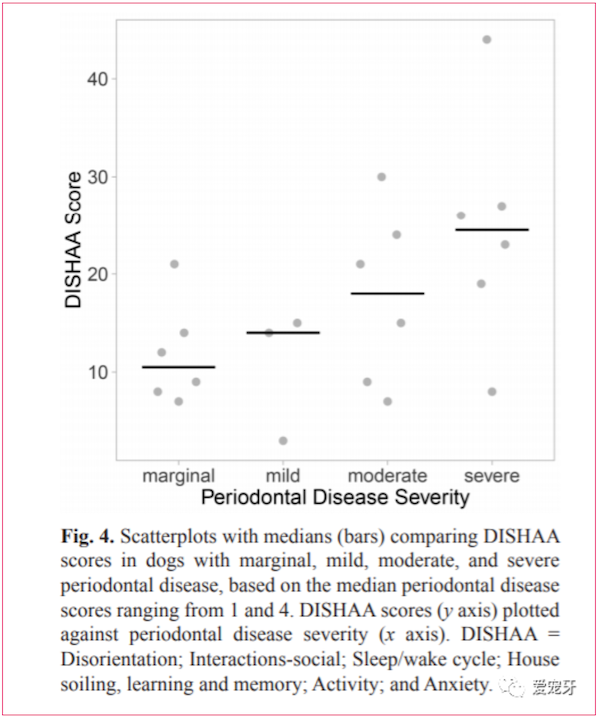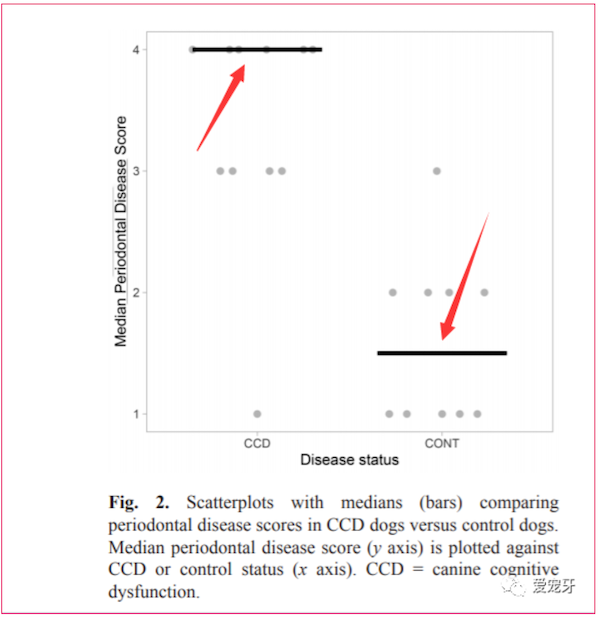
来源:Schankz 在 Vital Imagery 上的照片
关键点
就心理能力的年龄趋势而言,狗和人类之间有很多相似之处。总的来说,这两个物种随着年龄的增长都表现出认知能力的下降,并且当他们年老时都可能出现严重的痴呆症。在人类中,最常遇到的与年龄相关的智力下降的原因是阿尔茨海默病。年长的狗可能会受到非常相似的东西的影响,它被称为“犬认知功能障碍”或 CCD。虽然老年人这些智力衰退的确切原因仍在调查中,但众所周知,在大脑中,死亡和缠结的连接岛,称为β-淀粉样斑块,形成并中断了正常的神经系统。这些斑块的确切原因是许多研究的重点,但可能涉及领域非常之广。
最近的一些研究表明,口腔疾病的发生可能对阿兹海默疾病起着重要的作用。特别是牙周病或牙龈疾病已被证明是人类阿尔茨海默病的一个重要因素。研究表明,这些牙龈炎症和身体对它们的后续反应与阿尔茨海默氏症相关的某些损害有关,甚至可能导致某些损害。最近,纽约弗里维尔 Elemental Pet Vets 的 Curtis Wells Dewey 和康奈尔大学兽医学院的 Mark Rishniw 提供的数据表明,狗嘴里发生的事情可能与犬认知功能障碍。这些研究人员对 11 只已知 CCD 的老年犬(9 岁或以上)和 10 只年龄相仿但正常的对照组进行了测量。具体来说,他们拍摄了所有这些狗的嘴巴。众所周知,可以通过对口腔进行简单的目视检查来估计牙周病或牙龈疾病。两组狗的主人也得到了一份简短的问卷,以便更详细地评估症状的出现。

犬认知功能障碍的症状显而易见。带有 CCD 的狗似乎迷失了方向,茫然地盯着墙壁或太空,认不出熟悉的人,甚至在房子或自己的后院迷路。社交互动也减少了,狗在家里的访客、家人或其他宠物面前显得更加焦虑、不那么活跃和情绪反应。此外,他们的正常睡眠周期似乎受到干扰,他们更有可能在晚上醒来并从事踱步和不安的行为。通常,他们也开始表现出房屋弄脏的情况,并且对他们过去熟悉的命令反应迟钝。因此,由狗的主人完成的测量这些症状存在的问卷不仅可以验证狗是否患有 CCD,还可以验证问题的严重程度。这些狗的嘴巴照片包括嘴巴的正面和左右两侧的照片。这些照片后来被提供给 12 位兽医,他们评估了这组牙齿图像,并以 0 到 4 的等级对它们的牙周病进行评分。进行评分的兽医不知道任何一个的身份或实际诊断他们正在评估的狗。

结果相当简单。这项研究表明,与没有 CCD 的类似年龄的狗相比,患有犬认知功能障碍的老年犬往往表现出更严重的牙周病水平。此外,表明认知功能障碍程度的分数往往与牙龈疾病的程度呈正相关。这似乎与对人类的研究一致,该研究表明牙周病是阿尔茨海默病发展的危险因素。

由于这项研究本质上是相关的,因此研究人员无法明确确定狗嘴中的不良健康状况是犬认知功能障碍的真正原因还是促成因素。其他研究表明,让狗保持身心活跃并在饮食中添加抗氧化剂可能有助于预防 CCD。根据这些新数据,人们可能会认为,增加定期牙科护理也可能是防止与年龄相关的智力衰退的有用保护措施。鉴于目前的这些发现,我肯定会建议这样做。
参考文献:可以下载
Curtis Wells Dewey and Mark Rishniw (2021). Periodontal disease is associated with cognitive dysfunction in aging dogs: A blinded prospective comparison of visual periodontal and cognitive questionnaire scores. Open Veterinary Journal, 11(2): 210–216, DOI: 10.5455/OVJ.2021.v11.i2.4

延伸阅读
https://www.psychologytoday.com/intl/blog/canine-corner/201009/can-old-dogs-get-alzheimer-s-disease

There are a lot of similarities between dogs and humans when it comes to age trends in their mental abilities. In general, both species show a decline in their cognitive abilities when they age, and both may experience severe forms of dementia when they are older. In humans the most frequently encountered age-related source of diminished mental ability is Alzheimer's disease. Older dogs can be affected by something very similar and it is called "Canine Cognitive Dysfunction" or CCD. Although the exact causes of these mental declines in the elderly are still under investigation, it is known that, in the brain, islands of dead and tangled connections, called beta-amyloid plaques, form and interrupt normal neural processing. The exact causes of these plaques are the focus of much research but probably involve some microbial agents.Some recent research suggests that what is going on in an individual's mouth may play an important role. Specifically periodontal or gum disease has been shown to be an important factor in humans with Alzheimer's disease. Research suggests that these gum inflammations and the body's subsequent response to them are implicated as contributing to or perhaps even causing some of the damage associated with Alzheimer's. Recently Curtis Wells Dewey of Elemental Pet Vets in Freeville, New York, and Mark Rishniw of the College of Veterinary Medicine at Cornell University have provided data that suggests that what is going on in a dog's mouth may be similarly related to the mental problems associated with Canine Cognitive Dysfunction.These researchers took measurements on 11 aging dogs (9 years or older) who had known CCD and a control group of 10 dogs of a similar age who were normal. Specifically, they took photographs of the mouths of all of these dogs. It is well-established that an estimate of periodontal or gum disease can be gotten by simple visual inspection of the mouth. The owners of both groups of dogs were also given a short questionnaire to allow a more detailed assessment of the appearance of symptoms.The symptoms of Canine Cognitive Dysfunction are readily visible. Dogs with CCD seem to be disoriented, staring blankly at walls or into space, not recognizing familiar people, and even getting lost in the house or their own backyard. Social interactions are also diminished, and the dogs appear to be more anxious, less active, and emotionally reactive around visitors, family, or other pets in the house. In addition, their normal sleep cycle seems to be disrupted and they are more likely to wake at night and engage in pacing and restless behavior. Often they also begin to show house soiling and are less responsive to commands that they used to know well. Therefore a questionnaire measuring the presence of these symptoms completed by the owners of the dogs allows, not only the verification of whether the dogs had CCD or not but also the severity of the problem.The photographs of the mouths of these dogs included pictures of the front and right and left sides of the mouth. These photographs were later given to 12 veterinarians who evaluated the sets of dental images and scored them for periodontal dental disease on a scale ranging from 0 to 4. The veterinarians doing the scoring had no idea as to the identity or actual diagnosis of any of the dogs that they were assessing.The results were fairly straightforward. This study suggests that the older dogs with Canine Cognitive Dysfunction tended to show worse levels of periodontal disease than similarly aged dogs without CCD. Furthermore, the scores indicating the degree of cognitive dysfunction tended to correlate positively with the degree of gum disease. This seems to be in line with research on humans which showed that periodontal disease is a risk factor for the development of Alzheimer's disease.Since this study is correlational in nature the researchers can't definitively decide whether the poor health status in a dog's mouth is an actual cause of Canine Cognitive Dysfunction or a contributory factor. Other research has suggested that keeping dogs physically and mentally active and adding antioxidants to their diet may help prevent CCD. Based on these new data, one might suggest that adding regular dental care might also be a useful protective measure against age-related mental decline. Given these current findings, it is certainly something that I would suggest.





